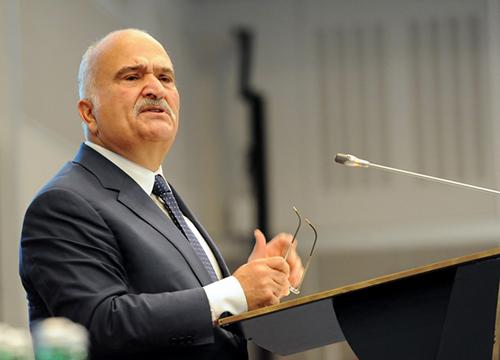Chairman's Message
The people of West Asia and North Africa belong to a region that has been highly significant throughout history. We must remember that this part of the world has always been a vibrant hub, where races, religions, languages and peoples blend and interact to create, inspire and innovate.
Increasingly, however, the region is characterised by the politics of the day. Constraints to growth, caused by ongoing conflicts, social exclusion and lack of cooperation in resources management, have overloaded the region’s carrying capacity. Human insecurity in the political, social, economic, and environmental spheres has inhibited human development, and vast amounts of money have been spent on creating a siege mentality, rather than a regional identity.
The absence of an internally generated vision for the region is conspicuous. Instead, we simply react to initiatives developed by our friends outside the region. This approach of convenience has resulted in a major conflict in the West Asia – North Africa region every decade since World War II.
We need a new regional architecture, and we have to provide substance for this architecture. Rather than the politics of division that have come to characterise our region, we require policies of inclusion. Such policies must involve all countries that have a stake in the issue. They must be inter-disciplinary, and not preference one way of thinking over another. Moreover, they must focus on the empowerment and enablement of all people. Only by focusing on human dignity, and only when people are enabled to live out their lives with self-respect, will we have stable countries and a peaceful region.
It was on this premise that the WANA Forum was founded back in 2009. It was the first supranational organisation of its kind, designed to help discover an authentic regional voice. Rather than reacting to events as they unfolded, the WANA Forum was mandated to provide a platform for discussion and ideas-sharing that could provide a roadmap for the shared challenges of the region. Preventative medicine if you will.
The last five years have steadily built upon this vision. With thanks to the generous support of the Nippon Foundation - aided greatly by the vision and social entreprepreunerial spirit of Chairman, Mr. Yohei Sasakawa - actors from myriad fields have convened here in Jordan, and further afield, to consider the ways we can begin to turn this region around. From the refugee crisis, to sustainable development, to building a regional identity, we have come together to forge a path forward.
Discussion, of course, is pointless unless it translates into actual action. That is what drives the work of my colleagues; the desire to ensure that the ideas developed during each WANA Forum are harnessed and transformed into tangible outcomes. To this end, in 2012 the WANA Forum launched two collaborative projects, the Human Integrated Management Approach (HIMA) Global Initiative and the Water Scarcity Brief. These initiatives both represent blueprints for home-grown solutions to serious regional challenges.
2015 is a momentous year. We are re-launching as the WANA Institute. Rather than a series of events, the WANA Institute is a process providing knowledge, tools and opportunities for partnership and policy development throughout the year.
Any post-2015 agenda for the region, and indeed regions across the world, must combine economic, social and environmental sustainability, with human dignity as their primary focus. For this reason, the WANA Institute has shifted its attention to three pillars: social justice, green economy and human security.
The WANA Institute is aiming to move from generic to organic. From politics to policies. From occasional conferences to regional conferences. It is only through this process that we can hope to take our first steps towards a meaningful roadmap for the people of West Asia and North Africa, aimed at stablising the region and returning it to the vibrant hub it once was.
What distinguishes the WANA Institute from its peers is its commitment to being consultative and inclusive. There is no shortage of information and advice being generated from outside our region. While well-intentioned, this flow of information and discussion is missing a crucial aspect: authenticity. The WANA Institute gathers together the leading minds of the West Asia – North Africa region to allow for discussion and idea generation from the people who have the greatest stake in seeing this region succeed – the WANA citizens themselves.
You are all part of this process. As the WANA Institute seeks to build solutions based upon an authentic regional voice, your voices are needed. We must engage in a contest of views that does not kill objectivity. We can accomplish this by working together on themes of common interest rather than by talking at each other about our differences. We can find ground for cooperation by referring to the respect for human dignity that is common to all of us.
The time is now for us to come together, reaffirm our common human dignity, and build a credible template of hope. We look forward to working with you to develop solutions for all the people of the West Asia – North Africa region.
Prince El Hassan bin Talal

